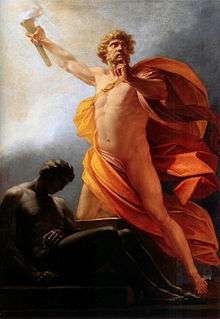Prometheus (Goethe)

"Prometheus" is a poem by Johann Wolfgang von Goethe, in which the character of the mythic Prometheus addresses God (as Zeus) in misotheist accusation and defiance. The poem was written between 1772 and 1774 and first published in 1789 after an anonymous and unauthorised publication in 1785 by Friedrich Heinrich Jacobi. It is an important work of the Sturm und Drang movement.
In early editions of the Collected Works it appeared in Volume II of Goethe's poems in a section of Vermischte Gedichte (assorted poems), shortly following the Gesang der Geister über den Wassern, and the Harzreise im Winter. It is immediately followed by "Ganymed", and the two poems together should be understood as a pair. Both belong to the period 1770–1775. Prometheus (1774) was planned as a drama but not completed, but this poem draws upon it. Prometheus is the creative and rebellious spirit which, rejected by God, angrily defies him and asserts itself; Ganymede is the boyish self which is adored and seduced by God. One is the lone defiant, the other the yielding acolyte. As the humanist poet, Goethe presents both identities as aspects or forms of the human condition.
Although the setting is classical, the address to the Judaeo-Christian god is suggested by the section beginning "Da ich ein Kind war..." ("When I was a child"): the use of Da is distinctive, and by it Goethe evokes the Lutheran translation of Saint Paul's First Epistle to the Corinthians, 13:11: "Da ich ein Kind war, da redete ich wie ein Kind..." ("When I was a child, I spoke as a child, I understood as a child, I thought as a child: but when I became a man, I put away childish things"). Unlike St Paul, Goethe's Prometheus grew up to disbelieve in the divine heart moved to pity for the afflicted.
The poem was set to music by J. F. Reichardt, Schubert (see "Prometheus", 1819), Hugo Wolf (1889) and F.M. Einheit (1993).
Text
 |
|
| Problems playing this file? See media help. | |
Bedecke deinen Himmel, Zeus, |
Cover thy spacious heavens, Zeus,
|
References
Sources
| German Wikisource has original text related to this article: |
| Wikisource has original text related to this article: |
- J. W. Goethe, Goethes Werke: Vollständige Ausgabe letzter Hand (Vol. II, pp. 76–78). (J. G. Cotta'sche Buchhandlung, Stuttgart and Tübingen 1827).
- J. W. Goethe, Gedichte (Aufbau-Verlag, Berlin and Tübingen 1988)
- J. W. Goethe, Werke Hamburger Ausgabe in 14 Bänden (Vol. 1 Gedichte und Epen I, pp. 44–46). München, 1998.
- Martin Luther, Die Bibel, oder die ganze Heilige Schrift des Alten und Neuen Testaments.